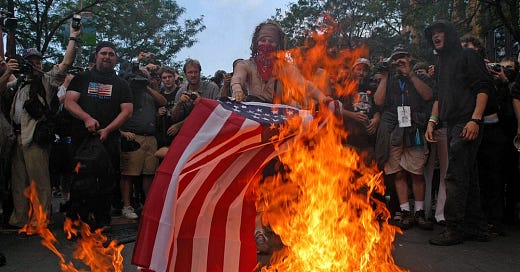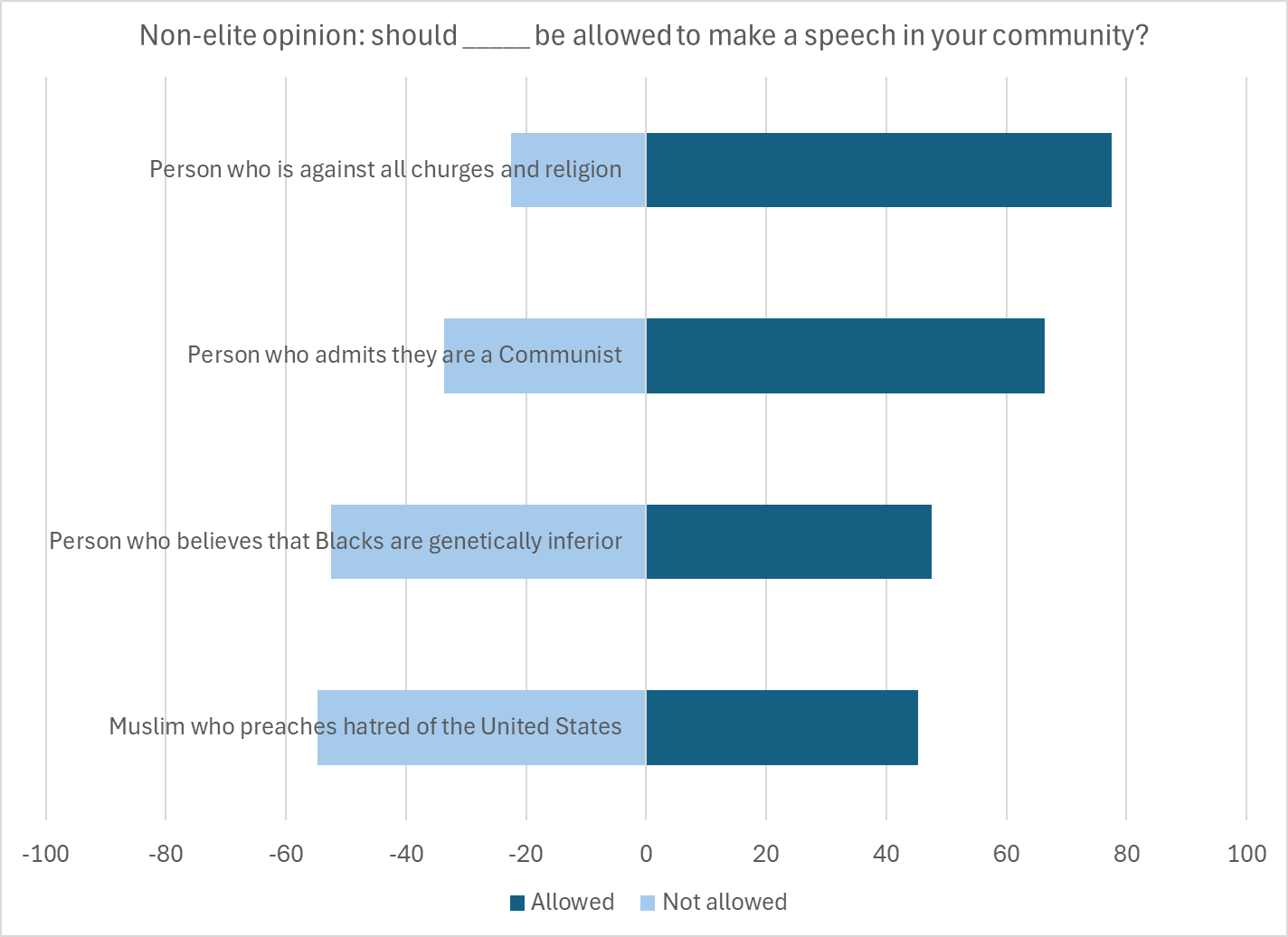There’s this great scene in the film The American President where President Jed Bartlett Andrew Sheppard comes to the defense freedom of speech (ok, mostly to the defense of his girlfriend, but also to the defense of freedom of speech). My favorite bit is this:
America isn't easy. America is advanced citizenship. You've gotta want it bad, 'cause it's gonna put up a fight. It's gonna say, "You want free speech? Let's see you acknowledge a man whose words make your blood boil, who's standing center stage and advocating at the top of his lungs that which you would spend a lifetime opposing at the top of yours." You want to claim this land as the land of the free? Then the symbol of your country cannot just be a flag. The symbol also has to be one of its citizens exercising his right to burn that flag in protest. Now show me that, defend that, celebrate that in your classrooms.
Then you can stand up and sing about the land of the free.
Now the rest of that speech is mostly left-of-center red meat (get the guns!), but I love the film anyway, and I love this bit because it’s true. It is hard, especially when you are in a supermajority, to put up with a vocal minority when you know you could just… vote them out of verbal or print existence.1
In the last post, we looked at differences in parenting values between elites and everyone else. This week, let’s start looking at political values. And one of the key ones in a democratic republic is freedom of speech. Without it, it’s pretty challenging to argue about what we should do with the republic. The first side to win an election just clamps down on presenting any alternative viewpoints, and that’s the ball game.
But is that what our upper class thinks? Let’s find out!
Luckily, we don’t have to go far: as with the last post, we can continue to use the General Social Survey It turns out that the GSS has some questions on this very topic, structured thusly:
There are always some people whose ideas are considered bad or dangerous by other people. For instance, somebody who is against all churches and religion
If such a person wanted to make a speech in your (city/town/community) against churches and religion, should he be allowed to speak, or not?
The questions rotate through a cast of undesirables, including an admitted Communist, a Muslim who preaches hatred of the United States, and a person who believes that Blacks are genetically inferior.2
Is the upper class undermining our right to freedom of speech? Using the same cutoff as we did previously established, here’s the first set of questions on giving a speech:
For every category of “bad and dangerous” idea, the economic elites are more likely to allow the person to give a speech than the rest of the population. And lest we conclude that this is just because the examples of “bad and dangerous” ideas were left-leaning, note that a majority of the non-elite would not allow a “person who believes that Blacks are genetically inferior” to give a speech in their community, while a majority (albeit a slim one) of the economic elites would allow it.3
[This is where I’d normally put up some graphs comparing the educated elite and everyone else, but as it happens there is not one statistically significant difference between the elite and non-elite by education, and the absolute differences are (a) small and (b) hard to see on a graph scaled on a mobile phone. The educated elites are slightly less supportive of the atheist (what?!) and a slightly larger majority of them would not allow the racist to speak (no surprise there…), but none of these differences gets within shooting range of p<0.05.]
The majorities of the economic elite supporting free speech for undesirable ideas shrinks dramatically between atheists and racists, so the last question I’ll examine in this post is this: which group is most consistent in its support for freedom of speech? Only 19.7 percent of the non-elites allowed all four undesirable speakers to give a speech in their community, while 31.2 percent of economic elites were so-called “free speech absolutists.” This difference was strongly statistically significant (p=0.004).4 Thus, far from the characterization of elites being “out of touch” with American values, it is the (economic) elites who are more likely to defend one of the core principles of our “advanced citizenship”: the freedom of speech.
Ok, here I have to admit that I do not know what it feels like to be in the supermajority and desire to quash a minority opinion. I do know what it feels like to be a vocal minority opinion, though, if you gave me Mjollnir or the One Ring, boy oh boy would I ever be tempted.
The survey also rotates through a number of scenarios, including a person of such “bad or dangerous” ideas making a speech, teaching at a college, or having a book of their ideas in the library. I think being okay with such things is also a mark of living in a modern, free society, but if one interprets college as a public college, then respondents might be asking whether it’s okay not to fund such speech with taxpayer dollars. Thus, I’ve restricted the analysis here to speech, but—spoiler alert—everyone, elite and otherwise, is considerably less supportive of “bad and dangerous” idea holders working in the local college.
Note, though, per my previous statements on statistically significant differences, the only difference between economic elites and non-elites that was not statistically significant at conventional levels (p<0.05) was the difference on the racist speaker.
As you might expect from my parenthetical, this difference was smaller and not statistically significant for educated elites and the general public (22.4 percent and 20.9 percent, respectively. The educated elites were higher, but neither statistically nor politically significantly so.).







Seems to hold true from anecdotal evidence but likewise I'd coach that with "within the Overton window". From my time among the dredges I think you will find people at the bottom (i.e. I think everyone of your posts on this topic would look differently if you compared let's say those living in abject poverty i.e. the poor to the upper middle class) are quite supportive of traditional western liberal values in practice though albeit lacking in articulating it. It's the middle class which is the outlier here as generally they are the most socially conservative group as they constantly live in fear of change as they detest the poor but likewise in their souls know they are always one negative random incident away from joining them.
Basically what I'm saying here I think is your data excluding the "rich" is getting strongly biased by not excluding the poor as well. This entire series is interesting including Henderson's posts but likewise it would be interesting the same exploration of the definition of "poor" because really what all these are talking about is "how to make the middle to upper middle class, which most of your readers and us too are part of, feel superior to other classes"
PS: Your Henderson threw me for a loop because I associate that with David Henderson of GMU (?) fame